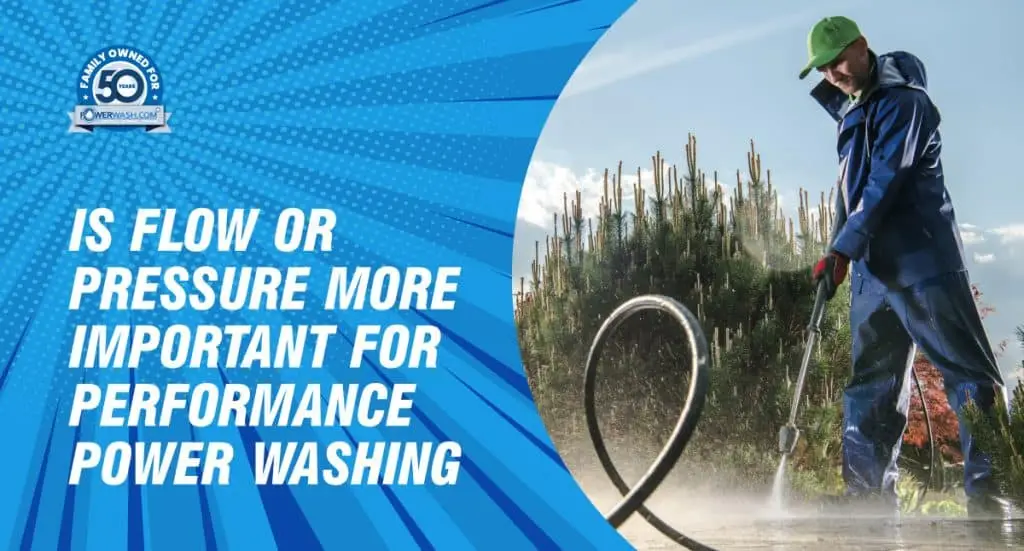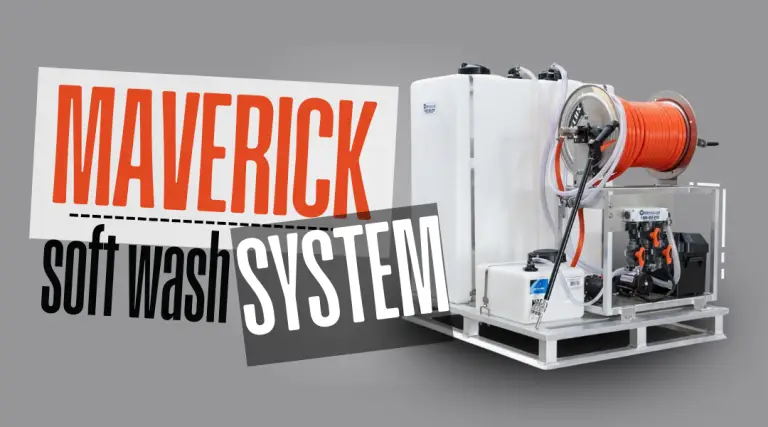- Home
- /
- Power Wash Basics
- /
- Is Flow or Pressure More Important for Performance Power Washing?
Subscribe To Our Newsletter
Stay in the know on the latest products, deals, events, tips & tricks.
Social Media

Is Flow or Pressure More Important for Performance Power Washing?
Flow and pressure can get confusing, so before we dive into specifics, let’s clarify what these terms mean. Flow refers to the volume of water delivered by the pressure washer. It is measured in gallons per minute (GPM) and determines how quickly you can clean a surface. On the other hand, pressure refers to the force at which the nozzle expels water. Pressure is measured in pounds per square inch (PSI) and determines the intensity of the cleaning action. Both flow and pressure play a crucial role in performance power washing, but which is more important?
GPM Versus PSI
Regarding performance power washing, two important measures that determine cleaning capacity are GPM (gallons per minute) and PSI (pounds per square inch).
What is GPM vs. PSI?
When it comes to performance power washing equipment, PSI measures the pressure that a power washer produces. And GPM measures the water flow the machine is capable of!
PSI (Pounds per Square Inch)
Now that we know PSI measures the water pressure a pressure washer produces let’s look at different PSI levels. These indicate how forcefully the water is sprayed onto a surface.
Light Duty
A light-duty pressure washer is the perfect choice for regular maintenance and light power washing jobs. These versatile pressure washing machines are designed to handle various cleaning tasks, from washing cars to cleaning patios or decks.
Light-duty pressure washers typically feature PSI (pounds per square inch) ranging from 1500 to 1900. This range of pressure is enough to effectively remove dirt, grime, and mild stains from various surfaces without causing any damage. These compact and portable machines are easy to maneuver and operate, making them suitable for smaller cleaning jobs that don’t require excessive power.
Medium Duty
Medium-duty pressure washers are the way to tackle tough dirt buildup and stubborn oil stains. With a classification ranging from 2,000 PSI to 2,800 PSI, they offer more power than light-duty pressure washers. Not only do they provide superior cleaning capabilities, but they are also versatile and can be used on a wide range of surfaces.
If the job has concrete, brick, or wood surfaces that need a thorough cleaning, a medium-duty pressure washer excels in removing dirt and grime from patios, sidings, roofs, decks, and fences. Whether dealing with years of accumulated dirt or stubborn stains, this power washer will get the job done. But remember not to use it on windows or vehicles as it is powerful enough to crack glass and dent cars!
Heavy Duty
A heavy-duty power washer has a PSI ranging from 2,900 to 3,200. This range is perfect for various tasks, including cleaning driveways, sidewalks, and pathways. It’s also commonly used to prep different surfaces for painting. If the job requires performance power washing a boat or yacht, a heavy-duty pressure washer is great for blasting away any algae and barnacles that might’ve gotten stuck on the bottom of the boat.
Extra Heavy Duty
Are you dealing with heavily stained driveways and caked-on dirt? This performance power washing job might need an extra heavy-duty pressure washer. These machines typically have a PSI rating of 3,300 and above and work perfectly to remove graffiti on walls. Remember that at around 4,000 PSI, a pressure washer can strip paint off surfaces. So, exercise caution if you plan to use it on painted fences, walls, or floors.
GPM (Gallons per Minute)
GPM, on the other hand, measures the amount of water flow that a pressure washer is capable of. It determines how quickly water is delivered to the surface being cleaned.
PSI and GPM play a significant role in determining the rate at which a pressure washer can effectively clean a given surface. But, contractors and professional cleaners must pay closer attention to the GPM rating.
A higher GPM rating typically results in better cleaning performance.
Benefits of Higher GPM Pressure Washers
Investing in a pressure washer with a higher GPM rating provides several benefits:
- Time savings – the increased water volume lets you clean larger areas in less time, making it ideal for commercial applications.
- Efficient cleaning – the higher GPM rating ensures a more thorough and effective removal of dirt, grime, and other stubborn stains from various surfaces.
- Versatility – a pressure washer with a higher GPM rating can tackle a wider range of cleaning tasks, including heavy-duty applications like cleaning driveways, decks, or even vehicles.
- Durability – the construction and components of higher GPM pressure washers are often designed to withstand more demanding use. Which means a longer lifespan!
The Role of Flow in Performance Power Washing
Flow – measured in GPMs – is a critical factor that directly affects the efficiency and speed of the performance power washing process. Remember how a higher flow rate allows for a larger volume of water to be delivered to the surface? That means more dirt and debris can be washed away in a shorter time. Think of it as a river rushing through a narrow channel versus flowing steadily through a wider one. The wider channel allows more water to pass through, resulting in a more thorough cleaning.
A higher flow rate also helps prevent the re-deposition of dirt and grime on the cleaned surface. The increased water flow creates a stronger force that pushes the dirt away and prevents it from settling back onto the surface. This is important when cleaning porous surfaces, such as concrete or brick, where dirt can easily get trapped in the tiny crevices. By maximizing the flow rate, power washers can reduce cleaning time and ensure a more effective and long-lasting clean.
Performance Power Washing | Key Takeaways:
- Flow refers to the volume of water delivered by the pressure washer.
- Flow is measured in gallons per minute (GPM) and determines how quickly the surface can be cleaned.
- Pressure refers to the force at which the water is expelled from the nozzle.
- Pressure is measured in pounds per square inch (PSI) and determines the intensity of the cleaning action.
- PSI and GPM play a significant role in determining the rate at which a pressure washer can effectively clean a given surface.
- Contractors and professional cleaners must pay closer attention to the GPM rating.
- Flow – measured in GPMs – is a critical factor that directly affects the efficiency and speed of the performance power washing process.
Performance Power Washing
When selecting a power washer, it’s crucial to consider both the flow rate and the pressure rating. A power washer with a high flow rate but low pressure may have difficulty removing stubborn stains. At the same time, a power washer with high pressure but a low flow may take longer to clean a large surface area. It’s important to choose a power washer that balances flow and pressure, depending on the specific pressure washing job needs.
By understanding the role of flow and pressure and finding the right balance, you can unleash the full potential of performance power washing and achieve outstanding cleaning results. POWERWASH.COM is passionate about helping you access everything you need to succeed at pressure washing – from the best power washing tips to equipment and detergents! Check us out and get started today!
Share This Post
More To Explore
Soft Wash Additive That Smells Amazing? Meet Fresh Wash
Freshen Up Every Wash Soft washing is all about precision, power, and presentation — and nothing completes a job like ...
Mastering the Art of Pressure Washing: Key Insights on Surface Cleaners
For professionals in the pressure washing industry, a surface cleaner is an indispensable tool, particularly for those who specialize in ...
The Wrangler™ Chemical Sprayer: The Ultimate Tool for Professional Cleaning Applications
For commercial cleaners and pressure washing professionals, efficient chemical application is key to achieving the best results. The Wrangler™ Chemical ...
Professional-Grade Soft Washing with the PowerWash.com Maverick 12V Soft Wash System
Soft washing is an advanced cleaning method that utilizes low-pressure water combined with biodegradable cleaning agents to effectively remove organic ...









